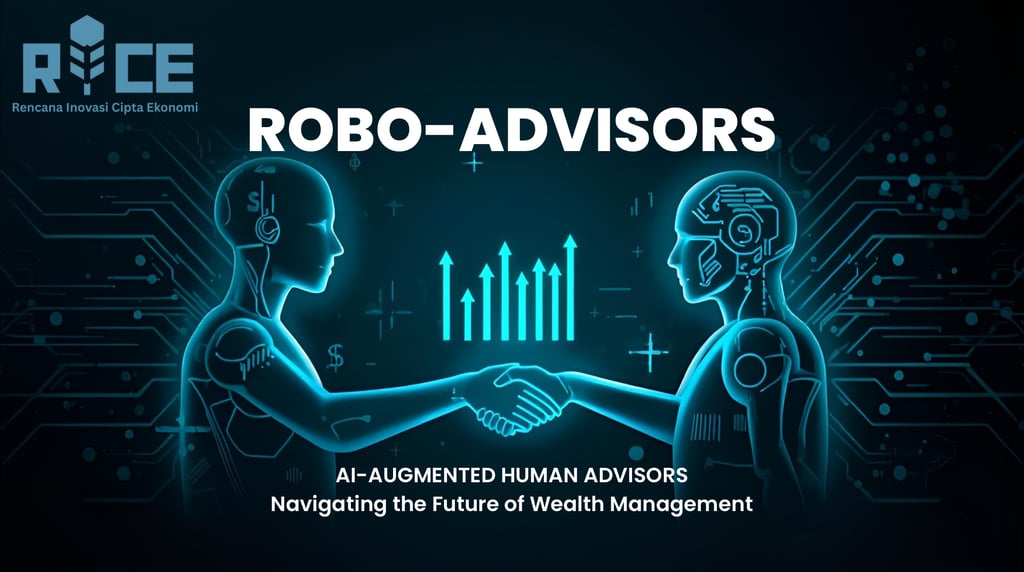Robo-Advisors vs. AI-Augmented Human Advisors: Navigating the Future of Wealth Management
Explore the essential comparison between robo-advisors and AI-augmented human advisors for modern wealth management.
TECHNOLOGY
Rice AI (Ratna)
11/2/20257 min read


Are you contemplating the most effective strategy for managing wealth in an increasingly digital world? The landscape of financial advisory services is undergoing a profound transformation, driven by advancements in artificial intelligence. Today, wealth management professionals and investors face a critical choice: fully automated robo-advisors or human advisors augmented by sophisticated AI tools. This pivotal decision impacts everything from investment performance and fee structures to the very nature of client relationships and bespoke financial planning. Understanding the nuances of each model is essential for making informed decisions in modern wealth management.
Understanding Robo-Advisors: Efficiency and Accessibility
Robo-advisors have democratized investment management, offering automated, algorithm-driven financial planning services. These digital platforms leverage sophisticated software to construct, manage, and rebalance investment portfolios. They typically operate with minimal human intervention, relying on user-provided data about risk tolerance, financial goals, and timelines.
The Core Mechanics of Robo-Advisory Platforms
At their heart, robo-advisors are powered by advanced algorithms designed to execute specific investment strategies. Clients typically complete an online questionnaire that assesses their financial situation, investment objectives, and capacity for risk. Based on these inputs, the platform recommends a diversified portfolio, often comprising low-cost exchange-traded funds (ETFs) and mutual funds. The system then automatically invests, monitors, and rebalances the portfolio to maintain its target allocation.
These platforms excel at implementing passive investment strategies, focusing on broad market exposure rather than active stock picking. Their systematic approach helps mitigate emotional biases that can often derail individual investor performance. For many, this automated, objective method provides a straightforward entry point into the investment world.
Key Advantages of Robo-Advisors
The primary appeal of robo-advisors lies in their cost-effectiveness and accessibility. They typically charge significantly lower fees than traditional human advisors, often a small percentage of assets under management (AUM) or a flat monthly fee. This low-cost structure makes professional-grade investment management attainable for investors with smaller portfolios or those just starting their investment journey.
Furthermore, robo-advisors offer unparalleled convenience and ease of use. Accounts can be opened online in minutes, and portfolios are managed 24/7, with clients able to monitor their investments from anywhere at any time. The automation of tasks like rebalancing and tax-loss harvesting can optimize returns and simplify tax reporting. They represent a significant step forward in digital wealth management, providing a user-friendly interface for complex financial operations.
Limitations and Considerations
Despite their advantages, robo-advisors come with inherent limitations. Their automated nature means they generally lack the capacity for highly personalized advice, especially concerning complex financial situations like estate planning, intricate tax strategies, or unique business financial structures. They follow predefined rules and algorithms, which may not adequately address the nuances of individual circumstances or significant life events. For instance, navigating a sudden inheritance or a business sale often requires a human touch.
Another significant drawback is the absence of human emotional intelligence. During periods of market volatility, investors often seek reassurance, a sounding board, or a calm voice to prevent panic-driven decisions. Robo-advisors, by design, cannot provide this psychological comfort or behavioral coaching. The "set-it-and-forget-it" approach, while efficient, may leave some investors feeling disconnected or unguided during critical financial junctures.
The Rise of AI-Augmented Human Advisors: The Best of Both Worlds?
As financial technology evolves, a hybrid model is gaining prominence: human financial advisors who leverage artificial intelligence to enhance their services. This approach seeks to combine the best attributes of human expertise and emotional intelligence with the analytical power and efficiency of AI.
Defining AI-Augmented Advisory Models
AI-augmented human advisors don't replace the human element; instead, they integrate AI tools into their practice to supercharge their capabilities. These AI systems assist advisors with data analysis, predictive modeling, risk assessment, and identifying investment opportunities that might otherwise be overlooked. For example, AI can quickly process vast amounts of market data, news, and economic indicators to highlight potential portfolio risks or opportunities, allowing advisors to make more informed decisions.
The technology can also automate routine administrative tasks, freeing up advisors to spend more time on complex client relationships and strategic planning. This includes generating personalized reports, streamlining compliance checks, and even crafting tailored communication plans. The goal is to elevate the human advisor's role, enabling them to provide deeper, more proactive, and highly personalized advice.
Synergies: Where Human Touch Meets AI Precision
The power of AI-augmented human advisors lies in the synergy between human and machine. AI provides the computational horsepower and objective analysis, while the human advisor brings empathy, judgment, and the ability to understand complex, non-quantifiable client needs. This combination allows for truly holistic financial planning, addressing not just investment portfolios but also estate planning, retirement strategies, philanthropic goals, and intergenerational wealth transfer.
Human advisors can interpret AI-generated insights within the context of a client's specific life circumstances, emotional well-being, and long-term aspirations. They can offer behavioral coaching, helping clients stick to their plans during market fluctuations or make rational decisions in times of personal stress. This nuanced, relationship-driven approach, supported by AI's analytical precision, offers a level of customization and support that pure robo-advisors cannot match. It’s about leveraging technology to deepen, rather than dilute, the client-advisor bond.
Addressing the Challenges and Evolving Landscape
Implementing an AI-augmented advisory model is not without its challenges. One significant factor is the typically higher cost compared to pure robo-advisors, as clients are paying for both advanced technology and human expertise. Advisors also need to continually adapt to new technologies, requiring ongoing training and investment in robust, integrated systems. Ensuring seamless integration of various AI tools into existing workflows can be complex and resource-intensive.
Furthermore, the ethical implications of using AI in financial advice, including data privacy and potential algorithmic biases, require careful consideration and robust governance frameworks. The landscape is continuously evolving, demanding that advisory firms remain agile and committed to both technological advancement and stringent ethical standards. As technology progresses, the bar for what constitutes "augmented" will continually rise, pushing advisors to stay at the forefront of financial innovation.
The Deciding Factors: Which Model Suits Your Wealth Management Needs?
Choosing between a robo-advisor and an AI-augmented human advisor hinges on a variety of personal and financial considerations. It's not a one-size-fits-all decision; rather, it depends on your specific financial goals, the complexity of your situation, your comfort with technology, and your desire for personal interaction.
Cost-Benefit Analysis and Investment Philosophy
For investors primarily focused on minimizing costs and comfortable with a hands-off approach, robo-advisors present an attractive option. Their low-fee structure is ideal for those seeking efficient, diversified portfolio management without the need for extensive human consultation. This model typically aligns with a passive investment philosophy, where the goal is to match market returns over the long term. If your investment strategy is straightforward and your financial situation is relatively uncomplicated, the cost savings can be substantial.
Conversely, if you value deeper strategic guidance, active portfolio management insights, or have a more complex investment philosophy that requires tailored approaches, the higher fees associated with AI-augmented human advisors may be a worthwhile investment. These advisors can offer strategies that go beyond basic market indexing, potentially uncovering unique opportunities or employing advanced risk mitigation techniques. It’s a trade-off between pure cost efficiency and comprehensive, bespoke financial expertise.
The Role of Personalization and Complexity
The complexity of your financial life is a major determinant in this choice. If your needs extend beyond basic investing—encompassing intricate tax planning, philanthropic giving, business succession planning, or multi-generational wealth transfer—a purely automated robo-advisor will likely fall short. These situations demand the nuanced understanding and strategic foresight that only a human advisor can provide, even with AI support.
AI-augmented human advisors excel in these complex scenarios. They can leverage AI to analyze intricate financial data, model various scenarios, and identify optimal solutions, but the final, personalized advice and implementation come from the human touch. They act as trusted navigators through life's most significant financial decisions, offering bespoke solutions that adapt to your evolving circumstances. The ability to converse with an expert who understands your unique situation, beyond just data points, becomes invaluable.
Psychological Comfort and Trust in Financial Guidance
Investing inevitably involves psychological elements. Market downturns can trigger fear, while booms can lead to overconfidence. In these emotionally charged environments, the objective logic of a robo-advisor, while analytically sound, offers no comfort. Many investors find immense value in having a human advisor to provide reassurance, explain market dynamics, and prevent rash decisions driven by emotion. This behavioral coaching is a critical, often underestimated, aspect of wealth management.
The element of trust is also paramount. Building a long-term relationship with a human advisor provides a sense of security and continuity, particularly when navigating significant life changes. This personal connection fosters a deeper understanding of your aspirations and concerns, allowing for advice that truly resonates. While AI can process data, it cannot replicate the empathy or the bespoke relationship essential for long-term financial peace of mind. For many, this human element fosters a level of trust that no algorithm, however sophisticated, can yet replicate.
The Future Trajectory: Towards a Hybrid Dominance?
The rapid pace of technological innovation suggests that the future of wealth management will likely see a continued blurring of lines between these two models. Pure robo-advisors are continually adding more features, including access to human advisors for specific questions, while human advisors are increasingly integrating sophisticated AI tools. This evolution points towards a future where hybrid solutions become the norm, offering a spectrum of services from largely automated to deeply personalized.
The Blurring Lines and Evolving Expectations
As AI capabilities advance, expectations for financial advice are also evolving. Investors will increasingly expect the efficiency and data-driven insights of AI, combined with the strategic wisdom and empathetic guidance of a human expert. This demand will drive further innovation, pushing both robo-advisors to offer more human touchpoints and human advisors to adopt even more powerful AI platforms. The ultimate goal is a hyper-personalized, dynamic, and responsive financial advisory experience. We anticipate a landscape where clients can seamlessly choose their preferred level of automation and human interaction, customizing their wealth management journey to their precise needs and preferences at any given moment.
Conclusion
The choice between a robo-advisor and an AI-augmented human advisor in modern wealth management is not about determining which is inherently "better," but rather which model best aligns with your specific financial profile, goals, and personal preferences. Robo-advisors offer an accessible, cost-effective, and efficient solution for straightforward investment needs, ideal for those comfortable with automated processes and seeking passive portfolio management. They democratize investing and provide a valuable entry point for many.
On the other hand, AI-augmented human advisors combine the analytical prowess of cutting-edge technology with the invaluable human elements of empathy, nuanced judgment, and personalized relationship management. This hybrid approach is particularly suited for individuals with complex financial situations, those navigating significant life events, or investors who simply value the psychological comfort and bespoke strategic guidance that only a human can provide. As the financial landscape continues its digital transformation, this model offers a holistic approach to wealth management that adapts to the intricate tapestry of individual lives.
The future of wealth management is undeniably a blend of human insight and artificial intelligence. Your decision should stem from a thorough evaluation of your individual financial objectives, your tolerance for fees, the level of personalization you require, and your desire for a direct, human connection. Evaluate your personal financial goals and risk tolerance. Consider the complexity of your financial life and the level of personal interaction you desire. Research providers in both categories to find a solution that empowers your financial future. The optimal path forward is one that leverages technology to serve your unique financial journey effectively.
#WealthManagement #RoboAdvisors #AIinFinance #FinancialPlanning #InvestmentStrategy #DigitalWealth #HumanAdvisors #FinTech #PersonalFinance #AIaugmented #FinancialTechnology #FutureofFinance #InvestorEducation #SmartInvesting #HybridAdvisory #DailyAITechnology
RICE AI Consultant
To be the most trusted partner in digital transformation and AI innovation, helping organizations grow sustainably and create a better future.
Connect with us
Email: consultant@riceai.net
+62 822-2154-2090 (Marketing)
© 2025. All rights reserved.


+62 851-1748-1134 (Office)
IG: @riceai.consultant
